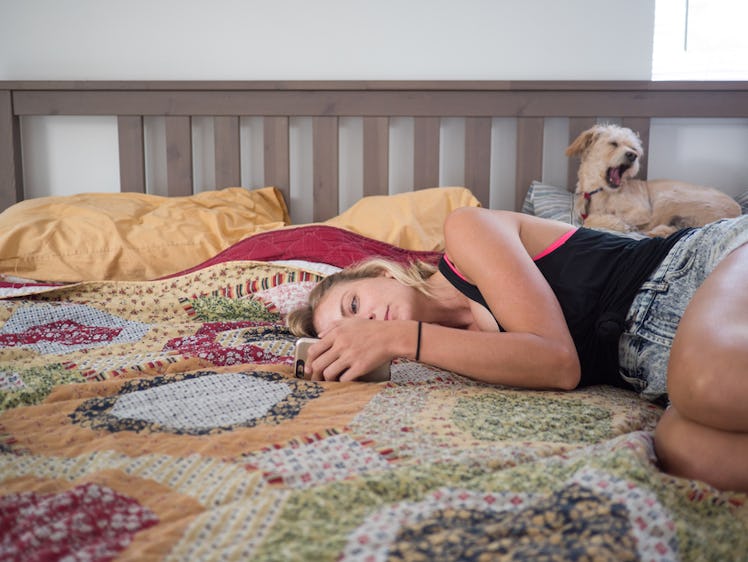
This Is How Just One Hour Of Social Media Affects Your Sleep, According To Science
For everyone out there who likes to catch up on their news right feeds right before they catch some shut-eye for the night, there's bad news on the horizon. If you've ever wondered whether social media affects your sleep, a new study by the Ontario Student Drug Use and Health Survey says it definitely does. The survey revealed that the more social media you use, the higher your odds are of a "shorter sleep duration," meaning less sleep than you probably need. I don't know about you guys, but I'm definitely guilty of this.
Here's how the survey worked: Researchers collected data from over 5,000 Canadian students between the ages of 11 and 20. The data included details related to their sleep duration (the amount of hours they slept each night) and the amount of time they spent on social media each day. The results of the survey revealed one extremely upsetting connection: Using social media for as little as one hour a day seriously affected the amount of sleep the students clocked in at night. Even worse, the odds for not getting enough sleep increased dramatically the more time they spent scrolling through social media.
An hour or more of social media time a day — TBH, that's not that much for most of us — had a massive impact on the students' sleeping patterns.
According to the study, for those who spent about an hour of time on social media a day, their odds ratio for not getting enough sleep (between seven and nine hours a night) was around 1.82 (any odds ratio greater than one implies that something is increasingly likely to happen). For those who spent at least five hours on social media, their odds of not getting enough sleep rose to 2.98.
Although the researchers involved in this survey were simply compiling data, rather than coming up with a complete explanation of the analysis, the effects of too much social media time are an increasing point of interest when it comes to health and wellness and, more specifically, our sleep schedules. One of the biggest concerns about social media in relation to our sleep is the blue light that smartphone screens give off, which basically tricks your brain into thinking that it's daytime, and keeps you feeling awake, when really, you should be sleeping.
However, it's not just the blue light that we have to worry about. There are other, more psychological aspects of social media use that could also contribute to sleep deprivation. Social media channels thrive off of constant updating, and it can be really easy to get hooked on refreshing your news feeds over and over again, because there's always something new for you to look at, whether it's a controversial political post, or a mouth-watering recipe video.
If this study hit you with a bit of a wake-up call, there are some things you can do to start consuming social media in a healthier way.
Too often, we use our phones without active thought, clicking onto apps and scrolling without even thinking about what we're doing. If that sounds like you, it might be worth it to take a week to actively and mindfully pay attention to just how much time you spend logging onto and scrolling through various social media channels, when you're doing it, and why.
One of the easiest ways to change your social media habits is to keep your phone away from you when you go to bed at night. If you use it as an alarm, try using an analog clock instead, or putting your phone somewhere in your room where you'll hear the alarm, but won't be able to reach for it in the middle of the night.
Social media gives us unprecedented opportunities to connect, learn, and empathize with people on a global scale, but that doesn't mean it's superior to good old-fashioned, in-person communication. Try to take some time to unplug, and your sleep cycle will definitely thank you for it.